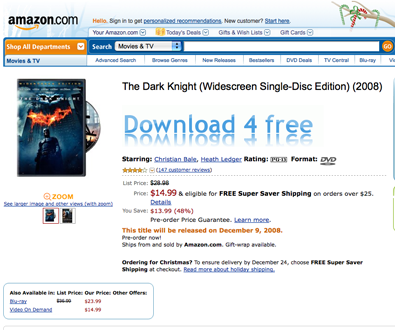
Last Monday, the “Pirates of the Amazon” project was launched. Described by its developers as “an artistic parody” and “a ready-made and social sculpture of contemporary internet user culture” that “addresses the topic of current media distribution models vs. current culture and technical possibilities”, it’s basically a Firefox add-on that inserts a “download 4 free” button on Amazon, which links to corresponding Piratebay BitTorrents. The add-on lowers the technical barrier to enable anyone to choose between “add to shopping cart” or “download 4 free”. ‘Pirates of the Amazon’ is not the only Amazon hack (remember Amazon Noir?) or pirate add-on for Firefox: IMDB, Last.fm, and Rotten Tomatoes all have their own pirate skin available. This particular one, developed by two students at the Media Design M.A. department of the Piet Zwart Institute Rotterdam, did get quite a bit of attention. It made headline news on digg.com and was covered by Torrentfreak, CNET, the Washington Post and thousands of blogs out there.
However, in a message posted on Nettime yesterday, Florian Cramer (who teaches at Piet Zwart) & jaromil (the project tutor) wrote that the project received a take down request by the lawyers of Amazon.com. They write: “In our point of view, the legal grounds for that are contestable since the add-on itself did not download anything. It only provided a user interface link between the web sites Amazon.com and thepiratebay.org. Nevertheless, the creators complied to the request, taking both the add-on and original web site offline”.
They continue: “What is perhaps more disturbing however, are the openly hostile and aggressive Internet user comments in blogs and on digg.com. Unlike in a comparable situation only a couple of years ago, the majority of commentators failed to see the highly parodistic and artistic nature of “Pirates of the Amazon”.” (…) Apart from its humorous value and cleverness, the project is interesting on many levels and layers: For example, not just as a funny artistic hack of Amazon.com and The Pirate Bay, but also as a critique of mainstream media consumer culture creating the great “content” overlap between the two sites. We clearly see this project as a practical media experiment and artistic design investigation into the status of media creation, distribution and consumption on the Internet.
With the take down notice from Amazon.com, our students have been scared away from pursuing their art, research and learning in our institute. We do not want a culture in which students have to preemptively censor their study because their work confronts culture with controversial and challenging issues. We would like to gather statements in support of the “Pirates of theAmazon”. The students are turning their web sites into a documentation of their project and the reactions it triggered. If you would like tosupport them and contribute a short statement, please get in touch with us.”
The add-on itself, by the way, is still available online, here for example (In Firefox > file > open file > select the xpi file)
update: interesting reaction from tobias c. van Veen
“What does it mean to connect two things together? Much of critical scholarly work relies upon the process of citation: taking a piece of X in order to link it to Y, and thereby revealing the ways in which X and Y relate to each other. Without the ability to cite things, to sample them and to link them together, the process of scholarly work, if not writing and creative action itself, is obliterated before it begins. What does citation mean on the internet? It means not only ‘sampling’ as we commonly grasp it, but the ability to hyperlink. What is critical scholarly work on the internet? Such work no longer only takes the shape of a discourse or commentary, an essay posted somewhere or a blog; such work is increasingly taking the shape — and has for some time — of a website or other piece of software that demonstrates the principles it wishes to investigate. Such is the software project [ pirates-of-the-amazon.com ]. By linking the BitTorrent search engine [piratebay.org] to [Amazon.com] in such a way to reveal the ‘links’ between paid and free content, a critical operation is opened between the two sites that, in its turn, opens a debate over the evolution of property in the 21st century. Such critical scholarly work in the shape of software, Firefox add-ons and other methods demonstrates its force precisely when it is able to carry out what it conceptualizes. Thus we must ask what is achieved when such work is not only attacked by the corporate entity in this discussion, Amazon.com, but when the service provider is pressured to in turn subject pressure on the scholarly researchers to censure, remove and shut down the project. This is nothing less than the censorship of a critical scholarly text — a kind of book-burning of the 21C. That it takes on a very different form today illustrates how censorship itself is no longer about *what* you write, or *where* you get it from, but how the nature of the citation itself — from written text to resampling code & providing links to controversial methods of property redistribution — has shifted with the digital era. While such censure demonstrates the value of critical online work such as [ pirates-of-the-amazon.com ], it is also all too frighteningly effective in silencing the possibility of debate over precisely these questions of property, citation, hyperlinking, and sampling”.